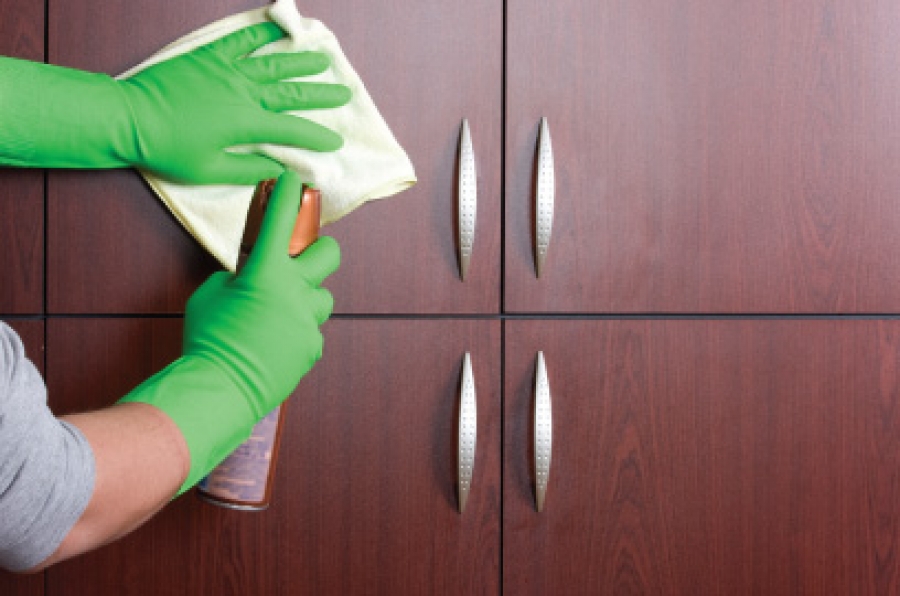Sanitation is about more than washing your hands, it is about protecting the integrity of your service, your clients and equally as important, yourself.
History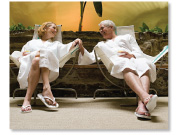
The adjective sanitary is from the French word sanitaire, which is from the latin word sanitus (meaning health), which is from the word sanus (meaning healthy, sane). Coincidentally it is also part of my favorite acronym: Sanus Par Aquam. Translation: Health through Water. S. P. A. If you do not know that acronym and this is the first time you have read it, read it again! SPA. Spa. SPA! Our industry and etymology is based on the word sanitary. As I see it, that means it is our job as professionals to teach, set the standard, implement and execute proper sanitation for our work environments.
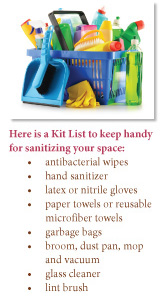 An Epidemic
An Epidemic
Less than a decade ago, California experienced an epidemic of mycobacteria (a type of localized skin infection) outbreaks. The common denominator amongst patients? A pedicure. Mycobacteria infections previously were predominant in operation rooms where water was present. Suddenly dozens of people were suffering from painful and unsightly lesions. Several cases were fatal. What does this mean to us as skin care professionals? Somewhere along the line, the torch of sanitation was not passed. We cannot compromise the basis of our oath to do no harm because we are feeling lazy. This is why we have licensing in the first place – to protect people!
First Impressions
Our journey in sanitation begins as soon as we walk through the door. Not only is it important to look clean, but anyone who passed pathology knows there is more than meets the eye with germs of all shapes and sizes. Sanitation might be one of the most underrated and an unglamorous part of our industry, but it is the most important and non-negotiable. First impressions are lasting! Think about what your clients come in contact with most frequent in your facilities… Door knobs, furniture, products. Think of day-to-day operations and experiences that involve contact on both your staff's or guest's behalf… The beverage station, retail products and – more important than any other item – tester bottles. Think about how many people touch tester bottles, then their face or body, then go on to try another product. I am not OCD or a germaphobe, but thinking about it starts to make myskin crawl!
Keep it Clean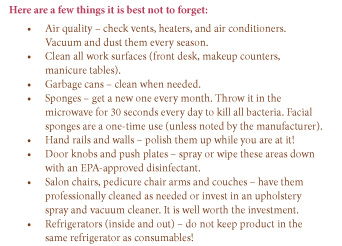 In my spa, our guests are offered a pair of slippers in lieu of wearing their street shoes in the facilities. For the longest time, I had a basket by the front door that was refurbished as needed through the day with clean slippers. When guests were done, they would turn in their used slippers and go on their merry way. Finally, I caught onto the fact that the lack of a labeled "clean" basket made some guests hesitant to use them and would forego the experience to be barefoot. I quickly remedied the situation by putting out baskets labeled clean and dirty. This proves that some things you know are sanitized, but your clients want more reassurance that you are keeping their experience clean. Always cover your tracks. Label, provide signage and promote your sanitation in the guests' best interest. I promise; it matters.
In my spa, our guests are offered a pair of slippers in lieu of wearing their street shoes in the facilities. For the longest time, I had a basket by the front door that was refurbished as needed through the day with clean slippers. When guests were done, they would turn in their used slippers and go on their merry way. Finally, I caught onto the fact that the lack of a labeled "clean" basket made some guests hesitant to use them and would forego the experience to be barefoot. I quickly remedied the situation by putting out baskets labeled clean and dirty. This proves that some things you know are sanitized, but your clients want more reassurance that you are keeping their experience clean. Always cover your tracks. Label, provide signage and promote your sanitation in the guests' best interest. I promise; it matters.
Let us move into the locker room or restrooms. One of the most important things, and my biggest hospitality pet peeve, is improper hand towel and receptacle placement. This is imperative to keeping both the guests and staff clean and healthy, while also lowering the risk of contaminating other touchable surfaces. Put hand towels (washable or disposable) next to the door with a laundry/waste basket. The point of washing your hands is to keep them clean, not touch the dirty bathroom door knob. Also, spray down the sink faucets, shower handles, toilet handle and anything else that unsanitary little critters might be crawling around on. Go ahead, go crazy! Spray and wipe to your heart's content. By the way, your mother will thank me later.
While we are on the topic of washable hand towels, please follow all state laws regarding sanitation procedures in your facility. If you think it is acceptable or sanitary in the state of New York to share a hand towel among guests, think again! In the name of reusable resources – actually sanitation – you must provide one time use towels, air dryers (very green!) or disposable options. As a general rule of thumb, you can find all guidelines for your states sanitation procedures on the state education or licensing website. Happy hunting.
Shall we continue with my sanitary tour d'spa? Wonderful.
Let us move on to treatment rooms (my favorite place in the spa aside from the snack room)! Speaking of snacks, in case you ever see one of those uniform-wearing, clipboard-toting state inspectors, hide all the snacks! Seriously. For you and the guests. It is not only considered illegal (gasp!) in most states, but unsanitary to have food products in work areas. This includes the front desk. I know all of you are ready to cry after reading that one, but some rules are just meant to be broken. I think they are more concerned with the army of mice and ants that will swarm your public facility should your sanitation skills be lacking. As for to treatments rooms, avoid the collection of dust bunnies, stray hairs and random product splatters if you can. One of the biggest turn offs to a client that is about to disrobe and get on the "what looks to be beautiful treatment table" in their birthday suit, is to see the remnants of the last lucky person that was blessed with your services. Seriously, take a moment and switch out sheets that have old product stains. Your client deserves it! I know they went through the wash. You know they went through the wash. Sometimes there is a psychological component to keeping things pretty.
Before, during and after a service, make it a habit to clean any bottle or equipment you and your client have come in contact with. Make a tote for each room with an arsenal of cleaning products with towels, disinfectant spray and wipes, and glass cleaner. This way you have everything you need to keep things sanitary at your immediate disposal. Being sanitary is not an innate habit. It takes discipline, redundancy and commitment to follow through. Make a list of items and stations in need of sanitation after ever client; hourly, daily or weekly.  Last but not least, the staff areas and laundry rooms are also important. I know some of you might be laughing out loud at this point – especially on the busiest days when you do not even have time to have lunch – but this is the heart of our operations. You are the first line of defense in the war on sanitation. I think organization is the predecessor to operations. Use it. Keep your cleaning supplies ready and accessible. Clean the faucet handle on your sink and the fridge door regularly. Wipe down the phone daily to discourage the wrath of nasty bacteria that can accumulate on it. One of my clients had come in for a facial with a staph infection from his cheek to his ear. Moral of the story: wipe the phone again! While I have our amazing male clientele on deck, lift the seat and clean it for them. They might have bad aim, you might use the toilet sitting, but nobody wants to see urine and stray hairs establishing a colony under your toilet seat. Details count.
Last but not least, the staff areas and laundry rooms are also important. I know some of you might be laughing out loud at this point – especially on the busiest days when you do not even have time to have lunch – but this is the heart of our operations. You are the first line of defense in the war on sanitation. I think organization is the predecessor to operations. Use it. Keep your cleaning supplies ready and accessible. Clean the faucet handle on your sink and the fridge door regularly. Wipe down the phone daily to discourage the wrath of nasty bacteria that can accumulate on it. One of my clients had come in for a facial with a staph infection from his cheek to his ear. Moral of the story: wipe the phone again! While I have our amazing male clientele on deck, lift the seat and clean it for them. They might have bad aim, you might use the toilet sitting, but nobody wants to see urine and stray hairs establishing a colony under your toilet seat. Details count.
Don't Get Personal
When providing a service and you need to sneeze, cough or any other form of expectoration, excuse yourself and wash your hands – even if you did not cough in them. Put yourself in your clients' shoes, please. If you were receiving a service, heard someone sneeze above you, and then went right back to your service, how would you feel? Gross. Show them that their health is of the utmost concern. It is the thought that counts. On the other hand, when the client needs a tissue while on the treatment table, you should oblige and then ask them to drop it on the floor when they are done. Pick it up with another tissue and dispose of it for them. Do not have them hold it in their hand to only loose it in the sheets. You and the laundry person will touch it later.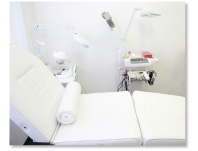
For most, cleaning is not a favorite pastime. It is overwhelming to say the least. The good news is that we are amazing professionals. We uphold a moral, professional and ethical code of protecting our clients, colleagues and ourselves. The other good news is you can use your sanitation-savvy as a marketing tool. Tell clients on your website, brochures or wherever appropriate that you are protecting them and their greatest investment, their health. Always act in the best interest of your clients and public health. You never know who walks through your door and what they are bringing or taking with them. My hope and goal for them is that they leave with a beautiful complexion and a spotless impression of a what a truly professional experience is – sanitary. My hope is that you do everything in your practice and power to make that happen.
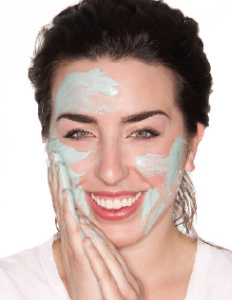 Antonia Schreiber is a NYS Licensed Massage Therapist, Cosmetologist, and Electrologist. Schreiber established, owns and operates The Windham Spa and The Windham Spa at Windham Mountain Ski Resort. She is also a contributor to Milady-Cengage Learning, a board member and consultant for the New York State Department of Education Career and Technical Education Advisory Committee, and is a volunteer educator and mentor to high school aesthetic and cosmetology students. Schreiber is currently working on future projects with the historic Kur Bad of Bad Kissingen in Bavaria, Germany. This email address is being protected from spambots. You need JavaScript enabled to view it.
Antonia Schreiber is a NYS Licensed Massage Therapist, Cosmetologist, and Electrologist. Schreiber established, owns and operates The Windham Spa and The Windham Spa at Windham Mountain Ski Resort. She is also a contributor to Milady-Cengage Learning, a board member and consultant for the New York State Department of Education Career and Technical Education Advisory Committee, and is a volunteer educator and mentor to high school aesthetic and cosmetology students. Schreiber is currently working on future projects with the historic Kur Bad of Bad Kissingen in Bavaria, Germany. This email address is being protected from spambots. You need JavaScript enabled to view it.
